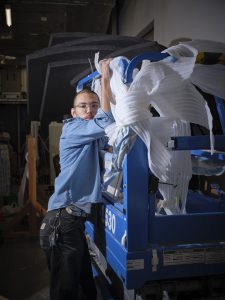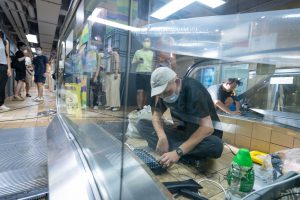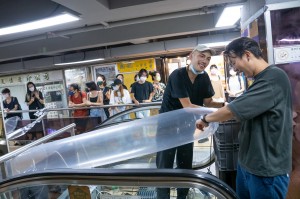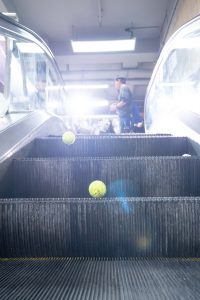artist support programme (ASP) alumni: Mark CHUNG Ching
「藝術家支援計劃」獲選藝術家:鍾正
閱讀完整訪談 (中文) >>>
–
Interview excerpt:
Mark Chung Ching (b.1990, Auckland, New Zealand) was raised in Hong Kong and received his Bachelor of Arts degree from the Academy of Visual Arts, Hong Kong Baptist University in 2014.
Mark’s most recent exhibitions include ‘Ætgereal’ (National Taiwan Museum of Arts, Taiwan, 2021), ‘Very Natural Actions’ (Tai Kwun Contemporary, Hong Kong, 2019), ‘The Velocity Between Pacing and Stopping’ (Galerie OVO, Taipei, 2019), ‘A Tree Fell in the Forest and No One’s There’ (Power Station of Art, Shanghai, 2018), ‘In the Open or in the Stealth’ (Museu d’Art Contemporani de Barcelona, Spain, 2018), ‘Wan Chai Grammatica: Past, Present, Future Tense’ (Hong Kong Art Centre, Hong Kong, 2018), ‘Empathic Park’ (CMC Gallery, City University of Hong Kong, Hong Kong, 2017), ‘A Book/Not a Book’, (AVA Gallery, Hong Kong Baptist University, Hong Kong, 2017), ‘Dawn Blossoms Plucked at Dawn’ (Duddell’s, Hong Kong, 2017), ‘Beyond Completion’ (Koo Ming Kwun Gallery, Hong Kong Baptist University, Hong Kong, 2017), ‘Bókverk / Artist’s Books: Printing Matter’ (Skaftfell Art Centre, Iceland, 2017), ‘Imagine there’s no country, Above us only our cities’ (Para Site, Hong Kong, 2015); ‘Mind the Gap’ (1a Space, Hong Kong, 2015).
Mark Chung Ching was supported by soundpocket’s Artist Support Programme 2015–16.
Personal website >>>
05.06.2021 (Sat)|5pm
Fu Lee Loy Shopping Centre, Hong Kong
◎ Recently: Insights from full-time working
soundpocket: Can you tell us what you’ve been up to lately?
Mark: I’m now working as an art technician.
soundpocket: You’ve managed to keep on creating while working as a full-time art technician. Has this job brought you any new inspirations, thoughts, or limitations to your creation?
Mark: It surely has limited my time spent on making art. When we’re setting up for an exhibition, we work nearly 13–14 hours a day, for an entire month. Even when we aren’t setting up, we work from Monday to Friday, and sometimes also have meetings from 10am till 5pm, which takes up a lot of time. My mind has been occupied with a lot of this stuff all the time, and it dragged down my pace of creation. However, after getting this job, there’s been a drastic change in the composition of my work. The emotions portrayed in my previous works fluctuated, and my creations were easily affected by my life at that time, my relationships with others, and things happening around me etc. But all of these were very personal. Now, the difference is that the sentiment of my creations comes from the anger of working, being full of grudges, and that grudges are somewhat universal – everyone’s sharing them, not only me. That sentiment is more universal.
soundpocket: I understand working will generate a sort of universal grudge against the senior workers, against some of the tough tasks… However, sentiments like “love” also carry a universal feeling of grudges – family members might also hold grudges against each other. Why do you think grudges outside of work are less universal?
Mark: First, it’s difficult for others to associate with my (personal) experiences. Secondly, say the grudge is about the social movement in Hong Kong, if we only use the social movement per se to develop the creative work, it will be flat and one-dimensional. But if you view it from another perspective—say almost intervening in the so-called social movement as “a slave”—that might be able to touch on all sorts of issues and ideologies, from a better perspective.
◎ ‘10 Years of ASP’ performance “glare”: Punctum of mundanity
soundpocket: Can you tell us more about the ‘10 Years of ASP’ performance that you’ve been working on with Samson?
Mark: So far, I only know that Samson will do a few things. He has thought of using the space of the escalators. As he knows the escalators will stop running at 8pm, he wants to perform between 7pm and 8pm. When the escalators stop at 8pm, the show will end. I often situated the performance’s main theme and focal points around his ideas. I am different from Samson: I don’t have the confidence in live performance that he does. I will prepare some sound sources in advance and create a soundscape on-site. I think I will also make some gadgets and let them make sound.
soundpocket: Do you want to explore the space of this Fu Lee Loy Shopping Centre throughout this performance, or not?
Mark: What I want to do is very concrete, which is that no matter if we wander around in the street, or do anything, actually there will be sounds that are very disturbing, but which we simply get used to. However, when you amplify the sounds by some means, and focus on listening to those sounds, you let others notice the characteristics of them. This might relate to my creations over these past two years: by amplifying the nuisance sound, and then turn that nuisance sound into my creation, I want the audience to be disturbed. Samson thinks the opposite way though. I am digging the unusual stuff out of the normalised situations, pointing out its abnormality to the audience – pointing out that it’s only you who treated it as normal. Samson, however, looks into an abnormal situation and tries to let the audience treat it as normal. Meanwhile, he is still aware that it is abnormal, but will find something in it that he finds comforting, and therefore that will convince him to continue treating it as a “normal” situation.
soundpocket: And why is the performance called “glare”?
Mark: Because a “glare” can be very comforting yet very discomforting. In fact, we pictured what the performance would be first, and then associated it with certain phenomena and situations afterwards.



